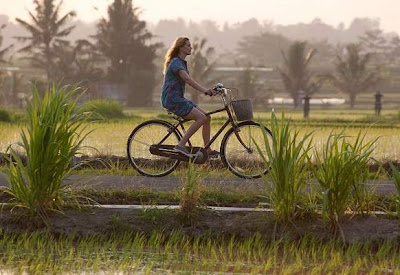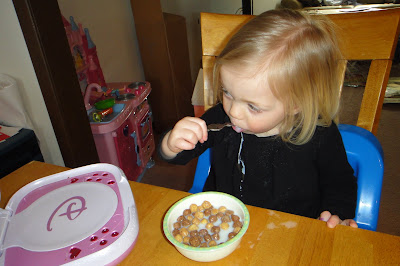“When you're struggling with those hard questions about love, despair, God, the point of your life, you really feel like you're alone on an iceberg with that,” Gilbert said in a recent interview. “It turns out those exact questions were being shared by about 10 million people. Turns out my own personal drama is an extremely representable one.”
In her early 30s, unhappy in her marriage and her life, Gilbert left her husband and her new suburban house in New York. She ultimately traveled to Italy, India and Indonesia, where she sought spiritual guidance and healing as well as forgiveness. “Eat, Pray, Love” is a memoir of that journey.
It has sold more than 10 million copies, has been translated into more than 30 languages and was made into a major motion picture starring Julia Roberts.
Gilbert is still figuring out how to deal with all that success.
“I try to respect it and be grateful for it and keep a little tiny bit of distance from it,” she said. “There was nothing in my life that led me to believe anything like that would have happened.”
If she's lucky, she said, people will be asking her about “Eat, Pray, Love” for the rest of her life.
There's little doubt that its impact will be long-lasting, at least for many readers.
Mandy Horrocks, a 34-year-old Omaha mother, is just one of many women who read Gilbert's book at that accidental right time.
Normally too busy with her career to read, Horrocks bought “Eat, Pray, Love” in the Omaha airport on her way to a business meeting in Boston. She couldn't put it down.
“From the first lines, I just thought, ‘Oh, my God, this is my life right now.' I just really connected.”
Horrocks read “Eat, Pray, Love” in October. A week before Christmas, she left her husband. In February, she left her job, a career she'd had for 12 years — 10 at the same place. A sales manager for a financial services company, Horrocks didn't want to be “on” all the time anymore.
Before quitting, she told herself every day for a year that her career would get better. Put your head down and work hard, she said. She knew she could make herself do that.
“But then I woke up one day and thought, ‘Why am I making myself do this?'”
Taking a cue from Gilbert, she's no longer doing it. Instead, she's trying to figure out what's next.
As for her marriage, Horrocks said she and her husband were on their way to separating anyway. But reading the book gave her a little more faith, a little more courage.
“It just kind of confirmed and reassured me that things like that can happen and be OK,” she said. “It reassured me that you do move on and do what's important in your life.”
Women today have an added challenge, Gilbert said, because they don't really have older generations to look up to. Their mothers and grandmothers didn't feel pulled in so many directions because they didn't have as many choices.
Gilbert said: “I can't ask my mother or my grandmother how they did this because they didn't have the life I had. She didn't have to do the thing we do where we look down our street and there are 10 different women with 10 different paths and each one forced us to ask ourselves if we did it the right way? Was I supposed to get divorced and move to India?”
Women have enormous political and educational freedoms now, Gilbert said. And because they don't have generations of role models to learn from and follow, they're all pioneering their own way. (“Thank God for the blogosphere,” she said).
It can get overwhelming, but women have a responsibility to own up to their choices, even when it means they don't get certainty, she said. Women often second-guess their decisions.
“Let us not deceive ourselves,” Gilbert said. “This is a tricky time to be a woman. Almost every day, we have six doors we could go through. Choosing one always comes with the danger that you should have gone through a different door.”
So what about Gilbert's choice? Is she happy?
She is. She remarried (her most recent book, “Committed,” is all about marriage), and she and her husband live in a river town of 1,000 people in rural New Jersey.
She has a garden where she grows mainly flowers (the town has a wonderful Farmer's Market for vegetables, plus she likes to look out her window and “see a ridiculously pointless pile of beauty.”) She takes yoga at a local studio. She walks her dog, Rocky. And she's working on her next book, a novel about 19th century botanical exploration.
At ICAN, Gilbert will talk about the process of writing “Eat, Pray, Love” and surviving its aftermath.
She'll start at the beginning of her writing career, when she was 8 or 9 years old and writing plays with her sister (she wrote, produced and directed a 10-minute musical in the fifth grade). She'll talk about the creative process and how to live a creative life as long as you're alive.
She'll talk about failures, too — the 10 years she spent trying to be a writer but not getting published.
But now, she's Elizabeth Gilbert. She took this scary step, left her marriage, traveled the world, found herself and love, wrote a best-seller, has been on “Oprah” ... isn't her life perfect?
Nah.
“The world is a shifty, spinny, complicated place where nothing is promised, where nothing remains the same,” she said. “Just when you get yourself straightened out, there's everyone else to deal with, too — all their fears and issues. The degree of compassion that's required to endure it is mighty.
“But unless you're really not paying attention, you're going to get a little smarter as you get older.”



